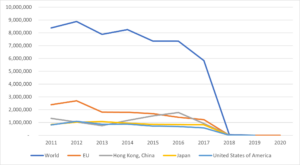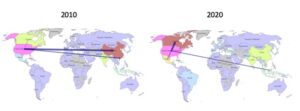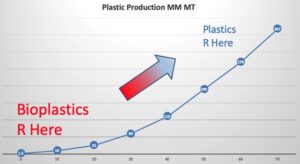Bioplastics Era Has Arrived
Dr. Bogdan Comanita,
LEC Partners
.We believe that the bioplastics era is upon us and this time around it is not driven only by what the more practical types would call the lofty goals of the sustainable economy but rather by the practical considerations of a little-known fact: China, the largest importer of scrap plastics has banned the imports starting as of 2018.
This has left all Western economies scrambling for a solution to the roughly 10 MM MT of scrap plastics previously absorbed by China. See Figure 1.

It is therefore not surprising that the pattern of the US scrap plastics exports has changed dramatically over the last decade. While most scrap exports went to China in 2010, today it is Canada that jumped to the rescue and help the US deal with the problem. See Figure 2
Figure 2 USA plastic scrap exports patterns change as China ban on plastic scrap import
The same situation could describe all the Western economies that are suddenly confronted to the reality that they either implement change in the way we deal with plastics or risk drowning in post-consumer waste. This will trigger profound changes in the way governments foster a favorable legal environment around the way we design, recycle and process end-of-life polymers and products.
Biopolymers are part of the solution and we anticipate growth that will emulate the polymers industry development cycle as shown in Figure 3. If we start with 1950, the plastics market was around 10 MM MT in the first decade and then went on to grow to around 400 MT by 2020. Plastics were the Internet of that era and produced a technological revolution that made the world today.
Figure 3 Bioplastics an emerging industry with a bright future
Similarly, biopolymers are in a comparable stage today. As the economy is heading decisively towards long-term sustainability new bioplastics will gradually replace traditional plastics. Recyclability is crucial to the new economy, however, the design of new materials and products, Biobased origin, and biodegradability have all a role to play. Legislation is already afoot all around the world with clear mandates, certification bodies, and related standards that are increasingly integrated globally. This is however the subject of an upcoming article.
ABOUT THE AUTHOR: Dr. Bogdan Comanita is the President of MarketChemica Inc. and an independent consultant with
LEC Partners
Group. The opinions expressed herein are those of the authors and do not necessarily reflect the opinions ofLEC Partners
, the world’s premier bioeconomy consulting group, with over 100 highly qualified experts serving in all these areas. We can assist show clients in obtaining maximum advantages performance-wise and economically from bio-jet fuels that appear to cost more at first glance. Take a look at our experts and the services we provide. In smaller projects, we have just the right expert. In larger projects, we have the advantage of assembling full-service, interdisciplinary teams with one point of contact. Call us at 1+ (501) 833-8511 or email us for more information.Have some questions?
Not sure where to start?
Let's start a conversation. We're here to help you navigate
the bioeconomy with confidence.


